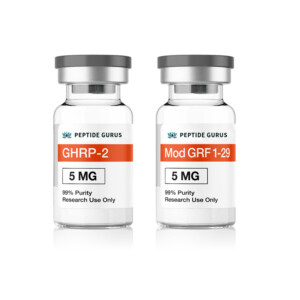Mod GRF 1-29 peptide, also known as CJC-1295 without DAC, is a synthetic peptide that is often used in research settings. As a growth hormone-releasing hormone (GHRH) analog, it has garnered attention for its potential to stimulate the pituitary gland to increase the production of growth hormone. While the peptide shows promise in various research applications, understanding the side effects associated with its usage is crucial for researchers and potential users alike. This article delves into the potential side effects of Mod GRF 1-29 peptide, informed by the latest FDA guidelines and industry insights.
One of the primary concerns when using any peptide, including Mod GRF 1-29, is the potential for allergic reactions. These reactions can range from mild to severe, with symptoms such as itching, redness, or swelling at the injection site. In rare cases, individuals may experience systemic allergic reactions, which can lead to more serious health issues. Therefore, it is essential for users to monitor their body’s response to the peptide, especially during the initial stages of use. Consulting with a healthcare professional before starting any new peptide regimen is highly recommended.
Another potential side effect of Mod GRF 1-29 peptide is water retention. This occurs when the body holds onto excess fluid, leading to swelling in various parts of the body, such as the hands, feet, or face. While water retention is generally not life-threatening, it can cause discomfort and may indicate an imbalance in the body’s fluid regulation mechanisms. Researchers and users should be aware of this side effect and take appropriate measures to manage it, such as adjusting the dosage or frequency of administration.
Mod GRF 1-29 peptide may also affect blood sugar levels. This is particularly relevant for individuals with pre-existing conditions such as diabetes or insulin resistance. The peptide’s ability to influence growth hormone levels can lead to fluctuations in glucose metabolism, necessitating close monitoring of blood sugar levels during its use. Researchers should be aware of this potential side effect and consider it when designing studies or recommending the peptide for research purposes.

Increased fatigue is another side effect that has been reported by some users of Mod GRF 1-29 peptide. This may be due to the body’s adjustment to the increased levels of growth hormone. While fatigue can be managed with adequate rest and nutrition, it is important for users to recognize this potential side effect and adjust their activities accordingly. Researchers should also consider this when evaluating the peptide’s impact on subjects.
Joint pain is a less common but notable side effect of Mod GRF 1-29 peptide. The increased growth hormone levels can lead to changes in joint and connective tissue, resulting in discomfort or pain. This side effect may be more pronounced in individuals with pre-existing joint conditions. As with other side effects, monitoring and adjusting the peptide dosage may help mitigate joint pain.
Mod GRF 1-29 peptide has been associated with changes in mood and sleep patterns. Some users report experiencing mood swings or disturbances in their sleep cycle, which can impact overall well-being. Researchers should be aware of these potential psychological side effects and take them into account when conducting studies or advising users on the peptide’s use.
The peptide may also influence appetite and body composition. Some users report changes in hunger levels or shifts in muscle-to-fat ratio, which can be attributed to the peptide’s effects on growth hormone and metabolism. These changes can be beneficial in certain research contexts but may require careful management to avoid adverse outcomes.
In addition to these side effects, Mod GRF 1-29 peptide can interact with other medications. It is important for users to disclose all medications and supplements they are taking to their healthcare provider to avoid potential interactions. Researchers should also consider these interactions when designing studies or evaluating the peptide’s effects.
While Mod GRF 1-29 peptide is generally considered safe when used appropriately, long-term effects are not fully understood. Ongoing research is needed to better understand the peptide’s safety profile and its implications for human health. Researchers and users should stay informed about the latest findings and guidelines to ensure safe and effective use.
PeptideGurus, a leader in the provision of high-quality research peptides, is committed to ensuring the safety and efficacy of its products. By partnering with WHO/GMP and ISO 9001:2008 certified manufacturers, PeptideGurus ensures that its peptides, including Mod GRF 1-29, meet the highest standards of quality and purity. This commitment to excellence is reflected in the company’s dedication to customer satisfaction and support.
PeptideGurus also collaborates with JANOSHIK LAB, a professional testing facility with over a decade of experience in peptide analysis. This partnership ensures that all products undergo rigorous testing for quality assurance, providing researchers with reliable and accurate results. By maintaining these high standards, PeptideGurus supports the scientific community in advancing research and discovery.
In conclusion, while Mod GRF 1-29 peptide offers promising research opportunities, it is essential to be aware of its potential side effects. By understanding these effects and following the latest FDA guidelines, researchers and users can make informed decisions about the peptide’s use. PeptideGurus remains a trusted resource for high-quality peptides, supporting the scientific community in its pursuit of knowledge and innovation.
PeptideGurus is a leading supplier of American-made research peptides, offering top-quality products at competitive prices. With a focus on excellence and customer service, they ensure a secure and convenient ordering process with global shipping.
CONTACT